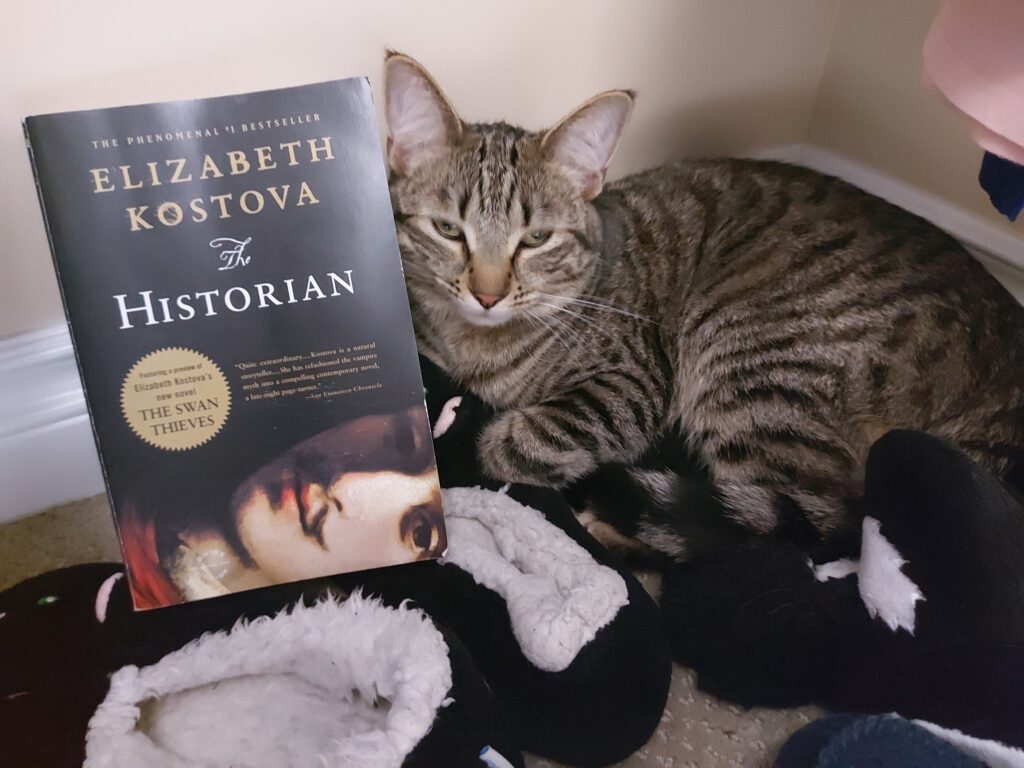The Historian by Elizabeth Kostova

The first time I read The Historian was way back in 2005 when it was first published. I liked it enough back then to read Kostova’s next novel, The Swan Thieves (which I have read more than once), and I decided to reread it now to see if I would still like it all these years later. If you like historical fiction, The Historian is a fascinating novel, but at the same time it can feel like a bit of a slog to read.
The Historian is like one of those Russian nesting dolls: it is a story that contains a story, that contains another story, that contains yet another story. The primary narrative is recounted by an unnamed narrator who in her fifties decides to tell the story of her father’s quest to find his missing friend and mentor, Bartholomew Rossi, as well as Vlad Tepes, the real-life historical figure also known as Dracula and who had a penchant for impaling people. In this novel, Vlad Tepes is believed to still be living, or rather, undead, and is actually the blood sucking monster upon which Bram Stoker based his story.
The unnamed narrator’s role in the story begins in the 1970s when she is a teenager living in Amsterdam with her American father. She finds an old book in his study which is imprinted with a woodcut of a dragon, a symbol associated with Dracula. Her father, Paul, then begins to tell her the story of how he found the book as a graduate student in the 1950s and showed it Bartholomew Rossi, who has a similar book that he found in the 1930s. Rossi reluctantly tells Paul about his research into Dracula and gives Paul his research notes. Then Rossi disappears under mysterious circumstances. Paul picks up Rossi’s research into Dracula in the hope of finding Rossi. He meets a Romanian woman named Helen Rossi, who is Bartholomew Rossi’s daughter, and who is also researching Dracula. Paul and Helen work together to look for Rossi, and by extension Dracula, travelling all over 1950s Eastern Europe. Meanwhile, in the 1970s, Paul has also disappeared, and his daughter sets out on her own quest to find him.
Most of The Historian is told in the epistolary format, which is a format that I do enjoy reading but requires the suspension of disbelief as people do not really write such detailed letters and recount the conversations they have so perfectly. The narrative of Paul and Helen’s search for Rossi is told through Paul’s letters to his daughter. Rossi’s own research into Dracula in the 1930s is told through letters he wrote to a friend and never posted, which come into Paul and Helen’s possession through Helen’s mother. The narration is exceptionally detailed. You can tell that Kostova spent a lot of time researching the subject of her novel and Eastern Europe, and as a reader you are transported to every country that the characters visit: France, Turkey, Hungary, Romania and Bulgaria. But there were times throughout the novel when I felt that there was just too much detail, that the characters spent too much time sitting around and talking, and I wanted the plot to hurry up and move along. It can also be difficult to tell when the narration switches between Paul, his daughter, and Rossi as their narrative voices are similar.
Throughout The Historian there is this pervasive feeling of dread and foreboding, not just because a supernatural monster and his minions are stalking Ross, Paul and Helen, but also because of the novel’s setting in Eastern Europe during the Cold War. Even though Paul and Helen are able to (too conveniently) travel to all these different Easter Bloc countries, they have to tread carefully as they are being pursued by Soviet allies who are also interested in finding Dracula, and who could detain and interrogate them if they make one mistake.
I am glad that I took the time to reread this novel, and I can see myself picking this book up again, maybe in another fifteen years or so when I have forgotten all about it. It is a good choice for readers who like richly imaginative historical fiction and who are also patient readers because it is a long book with a tiny font. The ending of The Historian is on the ambiguous side, but I found myself musing over it rather than feeling annoyed by it.